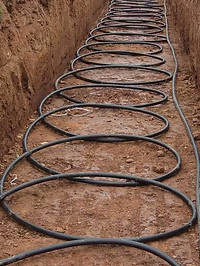




Ground Source Heat-Pumps
As the name suggests a ground source heat pump system harnesses the natural heat from underground and uses this heat to provide heating and / or hot water to the home.
The sun naturally keeps the earth warm, at two metres deep, the ground stays at a fairly constant temperature of around 10°C throughout the year.
A ground source heat pump uses a ground heat exchange loop to tap into this constantly replenished heat store to heat buildings and provide hot water. The technology used is the same as that used in refrigerators. Just as a fridge extracts heat from the food and transfers it into the kitchen, so a ground source heat pump extracts heat from the earth and transfers it into a building.
As the ground is a natural resource, Ground Source Heat pumps are a Eco friendly way to heat your home.
The cost of running a ground source heat pump to heat your home is much less than the cost of doing so using oil, LPG, or conventional electric heating.
They offer a very effective way of reducing your heating costs, every 1kW that you spend on electricity, the pump can generate between 3 to 4kW of heat.
In order to install a Ground source heatpump you will need:
-
the space to be able bury the ground loop pipework. The length of the ground loop depends on the size of your home and the amount of heat you need, Longer loops can draw more heat from the ground, but need more space to be buried in. If space is limited, a vertical borehole can be drilled instead.
-
A Utility Room / Outhouse or even the back of a Garage to store the Heatpump, Cylinder & Associated controls.



How does an Ground source heatpump work?
To Produce heat and hot water for your home, Ground Source Heat Pumps cirulate a mixture of water and antifreeze around a loop of pipe, called a ground loop, which is buried in your garden.
The heat from the ground is absorbed into the fluid which is then passed through a heat exchanger (Evaporator). The refrigeration liquid in the evaporator boils into a gas which is then compressed to produce a higher temperature typically between 35 – 60ºC . This hot gas then passes across a second heat exchanger (Condenser) This heat transferred in the second heat exchanger is then used to heat your property and provide hot water. Once the useful heat has been extracted, the refrigeration gas condenses back into a liquid to start the cycle again.
Where do Ground Source Heat Pumps work best?
Heat pumps make the most financial sense in properties which are off the gas grid and which therefore use expensive fuels like electricity, oil, LPG or coal for space heating.
If you’re connected to mains gas, then you’ll probably be better off with gas central heating.
A well insulated home with high standards of air-tightness is also preferable. This is because heat pumps are most effective in homes which warm up quickly and are good at keeping heat in.
Heating systems powered by heat pumps operate at a lower temperature than traditional heating systems, so they need a distribution system that delivers heat over a larger surface area. Radiators connected to heat-pump systems tend to be big, but not very hot whilst Underfloor heating systems work particularly well with a heat pump.
In all cases, improving the eneregy efficiency of your home first will help you reduce your heating needs and in turn enable you to run a smaller capacity and cheaper heat pump.
If you are heating the hot water by a Ground source heat pump then unless an integrated unit is used, a seperate hot water cylinder designed for heat pumps will be needed which will be located inside the building.

The benefits of Ground Source Heat Pumps
-
Lower fuel bills, especially if you are replacing conventional electric heating
-
potential income through the UK government’s Renewable Heat Incentive (RHI) - More information
-
lower home carbon emissions, depending on which fuel you are replacing
-
no fuel deliveries needed
-
minimal maintenance required
Integration with other energy sources
As with most renewable technologies, Ground Source Heat Pumps are able to integrate with other technologies:
-
Solar Thermal - Solar Thermal may provide all your domestic hot water needs during summer removing the need to run the heat pump at all, and so saving yourself the cost of the electricity.
-
Solar PV - Solar PV is the perfect combination for a Heat Pump as the electric generated from the PV Panels will help to power the Heat Pump.









